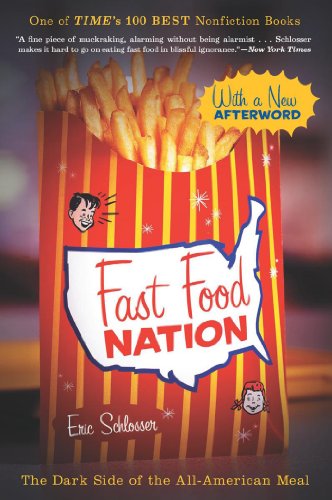Fast Food Nation Summary
7 min read ⌚
 The Dark Side of the All-American Meal
The Dark Side of the All-American Meal
Time to ruin your favorite meal! But no – we have no intention of talking about vegetarianism or veganism. We just want to tell you how your burgers and your French fries get to your table; and what’s actually in them.
And, boy, it’s a nasty sight – from the farm all the way to the life of the worker who hands you your order. Not to mention inside your Big Mac.
Eric Schlosser has all the details – in “Fast Food Nation.”
Who Should Read “Fast Food Nation”? And Why?
It’s not just Ridgemont High anymore – it’s fast times all around the world. And fast times ask for fast food: 1 in 2 Americans eats away from home nowadays, and 1 in 4 eats at a fast food restaurant.
No wonder the overall health of the country is declining, no wonder obesity is on the rise!
If you care about your health, “Fast Food Nation” is not a book you would want to miss. If there ever was a book which can make you rethink the way you eat – it’s this one! Even more – it can make you rethink the way you’re living your life.
Because “Fast Food Nation” is not only about the way you’re eating your food, but the way this affects the lives of many other people you don’t know. The rich get richer, the poor get poorer – even that may be your personal fault!
About Eric Schlosser
Eric Schlosser is an American award-winning investigative journalist. A regular contributor to “The Atlantic Monthly,” his work has also appeared in “The New Yorker,” “Rolling Stone,” “Vanity Fair,” and “The Nation.”
is an American award-winning investigative journalist. A regular contributor to “The Atlantic Monthly,” his work has also appeared in “The New Yorker,” “Rolling Stone,” “Vanity Fair,” and “The Nation.”
He has authored few bestselling books. “Reefer Madness” examines the American pornographic industry, the misuse of migrant workers in California, and argues for the decriminalization of marijuana. “Command and Control” is a “myth-shattering exposé of America’s nuclear weapons.”
In 2006, “Fast Food Nation” was adapted into a film directed by none other than Richard Linklater.
“Fast Food Nation PDF Summary”
This book should come with a warning: it’s quite possible that the burger you ate yesterday was the last you’ll ever eat in your life.
Because “Fast Food Nation” goes far and wide to convince you that every time you eat a hamburger, you’re making the world a bit worse. Not to mention the effects it has on your health.
Just ask Morgan Spurlock! He only ate McDonald’s food for a month and this had a drastic impact on his physical and psychological well-being!
But, then again – you may want to find an excuse – he ate too much and he didn’t exercise. I’ve only eaten few times at McDonald’s – so what’s the big deal?
A little history first!
McDonald’s is actually the company which made fast food a thing. And from the start – it wasn’t about good taste or healthy food. The McDonald brothers valued speed and efficiency above all!
So, they served only simple meals and adopted the factory assembly line inside their restaurants! The latter was revolutionary: every worker has in charge of just one simple task – and this reduced both costs and the time necessary to make a meal to the bare minimum!
And from 250 in 1960, McDonald’s rose to about 3,000 restaurants in 1973! No wonder Burger King, KFC, Wendy’s, Pizza Hut, Subway adopted the same model!
However, the success wasn’t all down to speed. It was also due to a dirty marketing trick nobody had every thought of before: targeting children and teenagers as potential customers!
About 90 percent of children between the ages of 3 and 9 visit McDonald’s at least once a month. That’s frightening to hear. Especially if you take into consideration how this came to be.
Namely, McDonald’s realized that kids trust commercials much more than adults, so they started exploiting this vulnerability.
Ronald McDonald, the playgrounds, the “Happy Meals” – they’re not there because McDonald’s loves your kids. They’re there because it knows that once your kid asks something from you – he or she will probably get it!
And the exploiting doesn’t end there!
Here’s a thought-provoking fact: two-thirds of American fast food workers are under 20! Most of them are migrants; almost all of them are poor. And no – that’s not because fast food restaurants want to give them a chance – unlike others.
It’s because the only ones who’ll ever work for a fast food restaurant are the ones with problems.
Don’t believe us?
Here’s another interesting trivia: about 70 percent of the robberies done at fast food restaurants are done by people who have either worked or were currently working for one of them at the time of the robbery!
The frightening thing is that fast food owners don’t even care. Because this way – they lose a lot less than if they improve the harsh working conditions of their employees. Who – by the way – are collectively fired if they ever get an idea of forming a union!
In a nutshell, wherever a fast food restaurant opens – everything gets ugly quite fast as well.
Because it’s not only about the employees. It’s also about everyone in the industry. U.S. potato farmers, for example, earn merely two cents for every $1.50-dollar French fries portion. And they can’t do anything about it, because, basically, the U.S. food industry is monopolized!
In their case, there are only three companies across America they can sell their products too!
And that’s just one less than the number of companies which slaughter about 90% of the country’s cattle!
And these meatpacking giants are the worst. They value a lost finger at no more than an average month’s pay – which is a few times higher than their workers’. Who, by the way, regularly take methamphetamine to keep up with the pace. And who can’t really protest because, basically, every fourth of them is illegally in the U.S.
No wonder that every time a slaughterhouse opens somewhere, the crime rates rocket.
Another thing which does the same: food poisoning victims! Almost 200,000 a day. And you only need to visit a slaughterhouse to see why.
We won’t go over the details so that you don’t start vomiting right away. But, we won’t skip over the most disgusting one, either.
Let’s just say that, sometimes, when you’re eating a burger, you’re also eating the things the animal it’s made of also ate.
Literally.
Yes, that’s what we’re talking about.
Key Lessons from “Fast Food Nation”
1. Fast Food Restaurants Exploit Children
2. The Food Is Cheap Because They Exploit Workers Too…
3. …and Because It’s Not Good Food – or Even Food at All
Fast Food Restaurants Exploit Children
Fast food restaurants seem nice and cozy – and are a great way to spend some time with your children on a Sunday, right?
On second thought, the answer to that question is irrelevant. What is – it’s the fact that they got to be that way by exploiting your children.
That’s right!
McDonald’s knowingly – we’re looking at you, Disney – built its marketing campaigns to target children and teenagers. Because a 5-year-old kid can’t a “Happy Meal” on itself! And because, unlike adults, you can easily manipulate children!
Now, how is this allowed?
The Food Is Cheap Because They Exploit Workers Too…
A hamburger and a cheeseburger cost about $1. Large French fries about $2.5. Have you ever wondered – what’s up with the prices?
There’s, unfortunately, an obvious answer: nobody responsible for bringing the hamburger from a cow to your table is paid what he/she deserves. And will never be – because fast food restaurants do everything in their power to maintain the status quo.
Illegal immigrants, teenagers, circumventing labor laws, preventing unions – you name it! They know all the strategies – and they are not afraid to use them!
…and Because It’s Not Good Food – or Even Food at All
Another reason why the food at McDonald’s and King Burger is so cheap – because it’s not actually good food. Neither the meat, nor the French fries are processed the way they should be.
Because fast food restaurants have learned another trick: the content is not important; the form is. In other words, it’s a hamburger if it takes like one. But, unfortunately, there are not many strawberries in your strawberry milkshake.
And, yes – there’s much more than potatoes in your favorite McDonald’s French fries. But, we don’t know what the “more” is.
All we know is that it’s “animal products.” And that 200,000 people get food poisoning each day.
Bon Appetit!
Like this summary? We’d like to invite you to download our free 12 min app, for more amazing summaries and audiobooks.
“Fast Food Nation” Quotes
The history of the twentieth century was dominated by the struggle against totalitarian systems of state power. The twenty-first will no doubt be marked by a struggle to curtail excessive corporate power. Share on X The medical literature on the causes of food poisoning is full of euphemisms and dry scientific terms... Behind them lies a simple explanation for why eating a hamburger can now make you seriously ill: There is shit in the meat. Share on X The market is a tool, and a useful one. But the worship of this tool is a hollow faith. Far more important than any tool is what you make with it. Share on X Congress should ban advertising that preys upon children, it should stop subsidizing dead-end jobs, it should pass tougher food safety laws, it should protect American workers from serious harm, it should fight against dangerous… Share on X Twenty years ago, teenage boys in the United States drank twice as much milk as soda; now they drink twice as much soda as milk. Share on XOur Critical Review
“Fast Food Nation” was voted by “Time” magazine to be one of the All-Time 100 Nonfiction Books. And if that’s not enough, just browse through thee reviews out there – the book is almost universally acclaimed as a modern classic, and regularly compared to Upton Sinclair’s 1906 novel “The Jungle”!
If you haven’t heard of that book by now, “The Jungle” – which also describes – is one of the earliest and greatest muckraking masterpieces. And if you haven’t heard that word by now, let us borrow for a second Wikipedia’s definition: “The term muckraker was used in the Progressive Era to reform-minded American journalists who attacked established institutions and leaders as corrupt.”
“The Jungle” managed – almost singlehandedly – to cause a public uproar which will culminate in the Federal Meat Inspection Act of 1906 (FMIA).
“Fast Food Nation” still hasn’t caused something on a comparable scale. But, if you ask us, with all the health declining and obesity rising, it shouldn’t be a question of if – but a question of when it inevitably will.
Emir is the Head of Marketing at 12min. In his spare time, he loves to meditate and play soccer.


 The Dark Side of the All-American Meal
The Dark Side of the All-American Meal 




